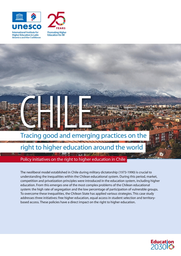Chile: tracing and emerging practices on the right to higher education around the world: policy initiatives on the right to higher education in Chile

The neoliberal model established in Chile during military dictatorship (1973-1990) is crucial to understanding the inequalities within the Chilean educational system. During this period, market, competition and privatization principles were introduced in the education system, including higher education. From this emerges one of the most complex problems of the Chilean educational system: the high rate of segregation and the low percentage of participation of vulnerable groups. To overcome these inequalities, the Chilean State has applied various strategies. This case study addresses three initiatives: free higher education, equal access in student selection and territory-based access. These policies have a direct impact on the right to higher education.
Year:
Organisation:
UNESCO-IESALC
Keywords:
higher education, Right to education, inclusive policy, research findings
Marginalized & Vulnerable group:
All
Topic:
System wide approach
Level of Education:
Higher Education
Type of Resources:
Research & Policy Papers
Country/Region:
Latin America & the Caribbean
Language of Publication:
English